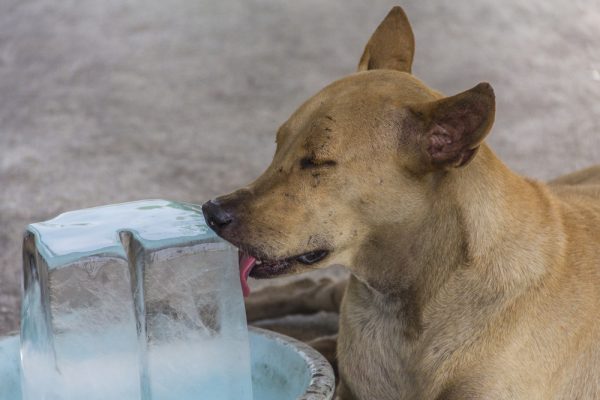Click to Skip Ahead
We’ve all been gnawing on our summer ice cream, enjoying every lick and all of a sudden—boom! The brain freeze hits. But what is this reaction? Can our dogs respond the same way?
According to science, they probably can, as they show similar signs that mimic that of a human having brain freeze, but this isn’t 100% proven. What exactly happens during brain freeze and how can we prevent it for our pups?
Dogs Can Probably Get Brain Freeze
Brain freeze is also known as an ice cream headache or cold-stimulus headache. It is a sudden, sharp searing pain through the head. While it isn’t dangerous or deadly, it certainly is painful!
Brain freeze happens when the temperature of the roof of the mouth and back of the throat dips significantly from the cold exposure. When it happens, it sets off a chain reaction to keep the brain warm involving the dilatation of brain vessels.
Although our anatomy is a bit different than a dog’s, our nerves work in a similar way. Since humans can get brain freeze it is thought that dogs can probably get brain freeze too. But this has never really been proven because we can’t measure a dog’s pain to stimuli such as coldness.

Signs of Brain Freeze in Dogs
It might be pretty easy for other brain-freeze professionals to identify a case of brain freeze when they see it. After all, it takes one to know one, right? Here are some possible signs that indicate brain freeze in dogs, especially if they’ve just eaten something cold like a frozen treat.
- Head shaking
- Trembling
- Violent sneezing
- Drooling
- Face rubbing
- Rolling/ restless behavior
- Refusal to continue eating
If you see your dog having a brain freeze moment, just take a second to let them recollect. Some dogs will decide they don’t want to repeat that mistake while others will suffer through just to try to chow down right after. Remember brain freeze should only last a few seconds to minutes. If your dog’s symptoms are ongoing or occur when they’re not eating something cold, there is something else going on. Problems like allergies, dental disease, and neurological issues can present in a similar way, so a vet visit may be in order if this is the case.
Preventing Brain Freeze in Dogs
Obviously the one way to prevent brain freeze is to prevent your dog from indulging in cold treats. They might not want to stay away from them—so, you should definitely take it up with your dog. They might have an opinion!
Keep in mind that while uncomfortable, brain freeze poses no real health risk to your pooch. So, if you see them wince, have some empathy and make sure to feed them slower (if their gluttony will allow!).

Dogs Eating Cold Foods
Is it okay for your dog to eat cold foods? Well, realistically, it is just as acceptable for our dogs to eat cold foods as it is for our humans. They can enjoy a cube of ice or a doggy-specific ice cream without consequence in most cases.
Remember that not all cold treats are suitable for dogs. Some contain potentially unhealthy or even toxic ingredients—like certain nuts, chocolate, and lots of sugar! Dog-specific is the way to go to ensure all is well.
 Conclusion
Conclusion
Now you understand that a dog can very likely experience brain freeze in the same way people can. Dogs are mammals and their nervous systems are set up quite similarly to ours, meaning our nerves and impulses are somewhat parallel.
Hopefully, you can put all your wondering to rest now that you know dogs can probably get brain freeze! If they seem like they were having a momentary malfunction, the cold is very likely the culprit!
Featured Image Credit: SakdatornSong, Shutterstock




 Conclusion
Conclusion






